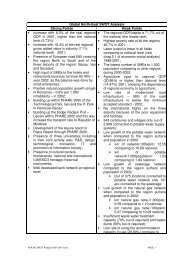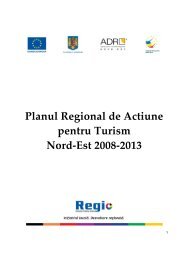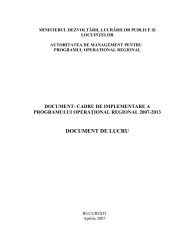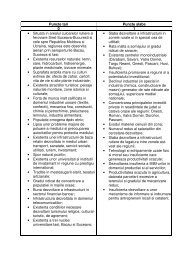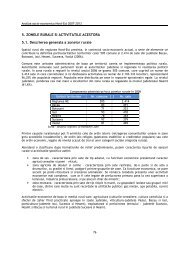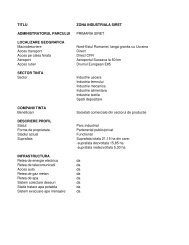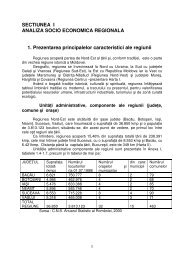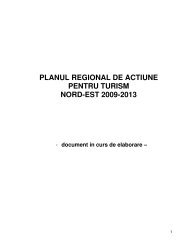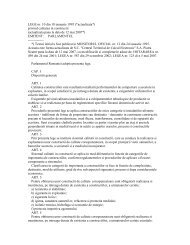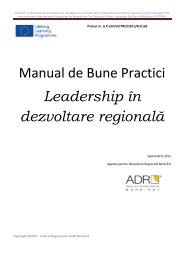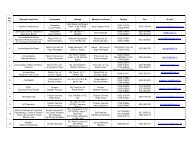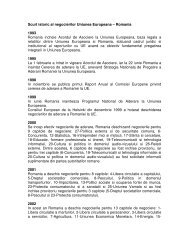EURADA News no. 288
EURADA News no. 288
EURADA News no. 288
Create successful ePaper yourself
Turn your PDF publications into a flip-book with our unique Google optimized e-Paper software.
<strong>EURADA</strong>-NEWS Nr <strong>288</strong> – 14.3.08<br />
European Association of Development Agencies<br />
Association Européenne des Agences de Développement<br />
Editeur Responsable : Christian SAUBLENS<br />
E<br />
SOMMAIRE<br />
EDITORIAL ................................................ 1<br />
DATES A RETENIR ................................... 1<br />
VIE DU RESEAU<br />
Snapshot Marketing Territorial ................. 2<br />
Décisions du CA ....................................... 2<br />
Politique de Cohésion post 2013 ............. 3<br />
Synthèse AG du 6.3.08 ............................ 4<br />
Christiane Bom Awards 2008 ................... 4<br />
WIC La Baule 2008 Awards ..................... 4<br />
REALISATIONS DE MEMBRES ................ 5<br />
PME<br />
Small Business Act ................................... 7<br />
Accès aux sources de financement ......... 7<br />
STATISTIQUES<br />
In<strong>no</strong>vation Scoreboard 2007 .................... 8<br />
PIB régional en 2005 ................................ 8<br />
AIDES D'ETAT<br />
Advantage West Midlands ....................... 9<br />
APPELS A PROPOSITIONS ..................... 10<br />
MANIFESTATIONS .................................... 11<br />
BIBLIOGRAPHIE ........................................ 11<br />
ANNEXE 1 Programme de travail 2008 CE<br />
ANNEXE 2 Eurostat – PIB régional<br />
SUMMARY<br />
EDITORIAL ................................................. 1<br />
IMPORTANT DATES .................................. 1<br />
LIFE OF THE NETWORK<br />
Snapshot Regional Marketing ................... 2<br />
Decisions of the Board .............................. 2<br />
Cohesion Policy post 2013 ....................... 3<br />
Summary General Assembly .................... 4<br />
Christiane Bom Awards 2008 ................... 4<br />
WIC La Baule 2008 Awards ...................... 4<br />
REALISATIONS OF THE MEMBERS ........ 5<br />
SME<br />
Small Business Act ................................... 7<br />
Access to finance ...................................... 7<br />
STATISTICS<br />
In<strong>no</strong>vation Scoreboard 2007 ..................... 8<br />
Regional GDP in 2005 .............................. 8<br />
STATE AID<br />
Advantage West Midlands ........................ 9<br />
CALL FOR PROPOSALS ........................... 10<br />
EVENTS ...................................................... 11<br />
BIBLIOGRAPHY ......................................... 11<br />
ANNEX 1 EC working programme 2008<br />
ANNEX 2 Eurostat – Regional GDP<br />
<strong>EURADA</strong> - Avenue des Arts 12 - Bte 7 - B 1210 Bruxelles<br />
Tel. +32 2 218 43 13 - Fax. +32 2 218 45 83 - E-mail : info@eurada.org
- 1 -<br />
<strong>EURADA</strong>-NEWS Nr <strong>288</strong> – 14.3.08<br />
EDITORIAL<br />
The question of sustainable development was addressed on several occasions in conferences<br />
and seminars organised by <strong>EURADA</strong> or in cooperation with third organisations.<br />
Will the adoption end of January of the Energy-Environment package by the European<br />
Commission really give market opportunities to the enterprises and territories which will be<br />
able to in<strong>no</strong>vate in products and services allowing the respect of the standards and<br />
objectives assigned to the 27 Member States ?<br />
The question is <strong>no</strong> longer to take into account the impact on the environment of the<br />
business support policies, investment in infrastructure and even the rehabilitation of derelict<br />
industrial sites, but rather to create regional ecosystems for the in<strong>no</strong>vation and<br />
commercialisation of products and services in connection with energy savings, the production<br />
of alternative energies and the reduction of CO².<br />
When analysing the ranking of the 100 most environment friendly world enterprises listed on<br />
the stock exchange established by the CNBC-European Business magazine in its January/<br />
February 2008 edition, big gaps appear between the territories accommodating leading<br />
enterprises in their sectors. Out of the 56 enterprises having as their core business products<br />
and services in connection with the environment or alternative energies, 13 of them are<br />
American, of which 5 from California. The geographical breakdown of the European<br />
companies of this sample is as follows :<br />
UK: 15 D: 6 DK: 3 CH: 2<br />
FIN, B, NL, I, IRL, S, E : 1 each<br />
The problem of the cost of energy and environment might also give rise to a prospective<br />
study which would be entitled "The territorial impact of the deglobalisation of industrial<br />
production due to transport costs and constraints linked to environmental protection".<br />
IMPORTANT DATES<br />
14/15.4.08 EBAN Congress 2008 – Arnhem (NL)<br />
4/5/6.6.08 WIC La Baule 2008<br />
2/4.7.08 INSME Annual Meeting 2008 – Guangzhou (Canton) (CN)<br />
18/19.9.08 CNER Annual Congress – Dunkerque (F)<br />
1/2.10.08 8 th CEEC Congress – Rzeszow (PL)<br />
19/22.10.08 IEDC Annual Conference in Atlanta (USA)<br />
20/21.11.08 Agorada 2008+
- 2 -<br />
<strong>EURADA</strong>-NEWS Nr <strong>288</strong> – 14.3.08<br />
LIFE OF THE NETWORK<br />
SNAPSHOT OF THE SEMINAR ON REGIONAL MARKETING OF 24.1.08<br />
The round table discussions organised with the <strong>EURADA</strong> members and representatives of<br />
Ernst & Young and IBM Plant Location mainly concerned the following subjects :<br />
the relations between RDAs and national FDI agencies;<br />
the new marketing tools;<br />
the difficulty to create a common image and a coherent message for a territory;<br />
the importance of the quality of life for attracting foreign investors;<br />
the attraction and retention of talents as well as the reverse brain drain;<br />
the phases or cycle of the location decision process;<br />
the sectorial specialisation (cluster) of the promotion campaigns;<br />
RDT and in<strong>no</strong>vation as intangible assets of a territory and their impact on the<br />
attractiveness of enterprises and talents.<br />
The following subjects were identified for future exchanges of experience between the<br />
members :<br />
attraction, retention and reverse brain drain;<br />
marketing European regions in the BRIC Countries (Brazil, Russia, India, China) and<br />
other emerging countries;<br />
the valorisation of the University-Enterprise relationships in clusters as factor of<br />
attractiveness of a region;<br />
How to coordinate the branding of a territory in order to reconcile the messages of<br />
different target audiences (tourists, students, researchers, skilled workforce,<br />
enterprises) according to different types of needs: production, logistics, back offices,<br />
research centres, …) ?<br />
Which strategy to target the enterprises operating in the high added-value services<br />
sector?<br />
How to maximise the exploitation of the national, regional and urban networks to attract<br />
foreign investors?<br />
It was suggested to study the feasibility of a regional marketing guide on the basis of case<br />
studies covering the various situations which the development agencies have to face in their<br />
regional marketing and branding approach.<br />
CENSUS OF THE DECISIONS TAKEN BY THE BOARD OF DIRECTORS OF 25.1.08<br />
1. Adoption of the minutes of the General Assembly of 15 November 2007.<br />
2. Adoption of the 2007 Annual Report (cf. Eurada-<strong>News</strong> Nr 285, 8.2.08).<br />
3. Cooptation of Lucyan PAPIERNIK of IGRETEC Charleroi (B) and of Stanislaw GINDA of<br />
the Bielsko-Biala RDA (PL) as members of the Executive Committee until 31 December<br />
2008.
- 3 -<br />
<strong>EURADA</strong>-NEWS Nr <strong>288</strong> – 14.3.08<br />
4. Adoption of the structure of the agenda of the Agorada 2008 event on the topic<br />
"Towards better RDA-University Partnerships for Regional Eco<strong>no</strong>mic Development".<br />
5. Exchange of views on the documents preparing the Round Table of Practitioners in<br />
Eco<strong>no</strong>mic Development on the cohesion policy post 2013 (February 2013) and the PPP<br />
meeting of the RDT regional strategy (end of April / early May 2008).<br />
6. Creation on an experimental basis of a <strong>EURADA</strong> resource centre in Timisoara for RDAs of<br />
the Central and Eastern European Countries.<br />
7. Tentative to obtain a quota of <strong>EURADA</strong> members participating in the Education/<br />
Business Forum organised by DG Education and Culture on 28/29 February 2008 (cf. e-<br />
mail dated 4.2.08).<br />
8. Launching a reflection on the way to take advantage at regional level of the EU 2 X 20%<br />
climate change plan (cf. editorial).<br />
DISCUSSION ON THE COHESION POLICY POST 2013<br />
During the exchange of views between the members of the Round Table of Practitioners in<br />
Eco<strong>no</strong>mic Development and DG Regio of 22 February last, the following topics were<br />
addressed :<br />
vision of the future cohesion policy;<br />
objectives of the future cohesion policy, namely the balance between the objectives<br />
linked to solidarity and those relating to the competitiveness and attractiveness of<br />
regions;<br />
coordination of the sectorial policies having a territorial impact;<br />
evaluation as a management instruments;<br />
administrative simplification, incl. in the field of State aid control and flexibility;<br />
concept of thematic programme of Community interest;<br />
relaxing the n+2 rule for projects/programmes focusing on intangible investment;<br />
integration of the rural development policy in the cohesion policy and use of the CAP<br />
budget for cultures with an energy potential and the agro-food sector;<br />
balance between grants and loans and other financial engineering mechanisms;<br />
strengthening the role of the regions in Community fund management;<br />
better coordination of the actions eligible for ESF and ERDF at regional level.<br />
With regard to the European Commission's working programme, here is the indicative<br />
calendar :<br />
• June 2008 : 5th mid-term report<br />
• September 2008 : Green Paper on the territorial cohesion, namely the challenges for<br />
regions in the field of demography, globalisation (exposure of the sectors of the socioeco<strong>no</strong>mic<br />
fabric), sensitivity to energy prices and impact of climate change<br />
• 2 nd half of 2008 : results of the foresight studies launched by DG Regio<br />
• End 2010-Early 2011 : 5th periodical report on cohesion laying down the big balances of<br />
the cohesion policy post 2013<br />
The document adopted by the Round Table's members was posted on DG Regio's web site<br />
as the contribution of <strong>EURADA</strong> to the consultation on the future of the cohesion policy. It is<br />
the subject of Eurada-<strong>News</strong> Nr 287, 12.3.08.
- 4 -<br />
<strong>EURADA</strong>-NEWS Nr <strong>288</strong> – 14.3.08<br />
SUMMARY OF THE GENERAL ASSEMBLY OF 6 MARCH 2008<br />
The 2007 financial year showed a carry over of €78,436.<br />
Mrs Laura de Esteban (IMADE) remplaces Félix Bellido in the Board of Directors.<br />
The cooptation of Lucyan Papiernik (IGRETEC Charleroi, B) and Stanislaw Ginda (Bielsko-<br />
Biala RDA, PL) in the Executive Committee until 31.12.08 was adopted.<br />
The next statutory election will take place during the General Assembly of 20 November<br />
next.<br />
CHRISTIANE BOM AWARDS 2008<br />
During Agorada 2008, Jacques Evrard, President of <strong>EURADA</strong>, has handed over the<br />
Christiane Bom Awards to :<br />
<br />
<br />
Nicola De Michelis of DG Regio<br />
Pierre Guénant and Patrice Lefeu of the Europe+ Foundation WIC La Baule<br />
Nicola De Michelis is the fourth representative of the European Commission to be rewarded,<br />
after Mikel Landabaso (DG Regio), Timo Summa (DG Enterprise and Industry) and Dimitri<br />
Corpakis (DG Research).<br />
WIC LA BAULE 2008 – AWARDS<br />
Three awards will be given this year to development agencies having attracted a significant<br />
investment on their territories.<br />
The participation form is available on http://www.labaulewic.org/awards/best-investmenteurope.asp<br />
See also the enclosed brochure.
- 5 -<br />
<strong>EURADA</strong>-NEWS Nr <strong>288</strong> – 14.3.08<br />
REALISATIONS OF THE MEMBERS<br />
CO-MAKERS ROMANIA SUBCONTRACTING NETWORK<br />
Global sourcing is becoming more and more important in the fast changing European<br />
automotive and machine building industries. The entry of Romania to the European Union<br />
has created new opportunities for Western European companies for outsourcing and<br />
subcontracting industrial activities to Romania. Western Romania is located ideally close to<br />
the well developed transport infrastructure of Hungary.<br />
This is one of the main reasons why the Dutch company Co-makers International and West<br />
Regional Development Agency Romania decided to open a joint office in Timisoara, under<br />
the brand “Co-makers Romania Subcontracting Network”, in August 2007.<br />
For the kick-off of the activities of Co-makers Romania and the first activity for the Comakers<br />
Romania Subcontracting Network a matchmaking event was organised in December<br />
2007 in Timisoara. This matchmaking event was the highlight of a three day mission<br />
organised by Co-makers Romania which consisted of a delegation of 9 buyer companies from<br />
the Benelux.<br />
For further information, contact :<br />
Co-makers Romania Subcontracting Network<br />
Cristi Cistelecan cristi.cistelecan@adrvest.ro<br />
Joep Kolk j.kolk@co-makers.com<br />
Proclamatia de la Timisoara 5<br />
RO – Timisoara – 300054<br />
Tel. +40 [256] 491 981<br />
Fax.+40 [256] 491 923<br />
E-mail: office@adrvest.ro<br />
www.adrvest.ro<br />
LAUNCH OF WEST REGION FORESIGHT EXERCISES ON ICT AND AUTOMOTIVE SECTORS<br />
WITHIN THE BEFORE PROJECT<br />
The Kickoff Conference of the Regional Foresight Exercise for the ICT and Automotive<br />
Sectors in West Romania Region took place on 28 February 2008. The event was organized<br />
by the Regional Development Agency of West Romania in the framework of the FP6 Project<br />
Benchmarking and Foresight for the Regions of Europe (BeFore). BeFore is an EC-funded<br />
initiative coordinated by Castilla y Leon that aims at carrying out foresight studies of policies<br />
and support instruments for RTD- intensive and high value-added sectors. West Romania<br />
decided to focus on ICT and Automotive.<br />
The conference opened to public consultation the two foresight projects proposed by the<br />
RDA and its specialized consultant - Manchester Institute of In<strong>no</strong>vation Research (MIoIR): a<br />
foresight exercise on the theme of developing a research-driven automotive cluster in West
- 6 -<br />
<strong>EURADA</strong>-NEWS Nr <strong>288</strong> – 14.3.08<br />
Romania and one foresight study focusing on identifying a list of key tech<strong>no</strong>logies around<br />
which the service portfolio of the future ICT Pole of Excellence would be defined.<br />
For further information, contact :<br />
Raluca Cibu-Buzac raluca.cibu@adrvest.ro<br />
ADR Vest<br />
Proclamatia de la Timisoara 5<br />
RO – Timisoara – 300054<br />
Tel. +40 [256] 491 923<br />
Fax.+40 [256] 491 981
- 7 -<br />
<strong>EURADA</strong>-NEWS Nr <strong>288</strong> – 14.3.08<br />
S M E<br />
SMALL BUSINESS ACT<br />
DG Enterprise and Industry launches a public consultation regarding the adoption of a "Small<br />
Business Act" for 'Europe. This Act's main aim will be to set principles and measures to<br />
improve the framework conditions for European SMEs. This consultation is part of the<br />
process to come up in June 2008 with a proposal from the EU Commission.<br />
Members can of course send their own contributions to this consultation. To take part in this<br />
consultation go to the SBA dedicated web site<br />
http://ec.europa.eu/yourvoice/ipm/forms/dispatch<br />
ACCESS TO FINANCE<br />
Microcredit<br />
Further to the communication on microdredit (cf. Eurada-<strong>News</strong> Nr. 283, 7.12.07) the<br />
European Investment Bank and the European Commission are studying the modalities of a<br />
pilot action endowed with €40 million which would target the <strong>no</strong>n banking operators active in<br />
the area. This initiative should be launched end of 2008 or early 2009.<br />
Small Business Act<br />
Within the framework of the "Access to Finance" part, the Commission would like to address<br />
the concept of "Mezzanine", above all for small amounts, and the concept of techniques to<br />
improve the quality of the demand for finance (hands-on management, by-measures,<br />
investment readiness), insofar as the European Union is able to bring an added value in this<br />
matter (which one ?).<br />
SME financing market<br />
According to the European bank associations, the subprime crisis does <strong>no</strong>t affect the volume<br />
of money available for SMEs. However, the cost of credit should increase in the short term as<br />
well as the guarantee requirements.<br />
Note by the Secretariat: I would be interested in any information explaining why banks have<br />
considered as less important the risk linked to subprime than the risk linked to loans to<br />
in<strong>no</strong>vative SMEs. Thanks in advance.
- 8 -<br />
<strong>EURADA</strong>-NEWS Nr <strong>288</strong> – 14.3.08<br />
STATISTICS<br />
INNOVATION SCOREBOARD 2007<br />
As a reminder, this yearly exercise carried out on behalf of the European Commission aims at<br />
comparing the performance of the EU member States with the one of third countries (USA,<br />
Japan, Switzerland, Israel, Norway, …).<br />
The gap between Europe and the USA is progressively closing.<br />
The EU Member States are grouped in four categories:<br />
• The in<strong>no</strong>vation leaders, with Sweden as the most in<strong>no</strong>vative country, and other<br />
countries including Denmark, Finland, Germany, Israel, Japan, Switzerland, the UK and<br />
the US.<br />
• The in<strong>no</strong>vation followers include Austria, Belgium, Canada, France, Iceland, Ireland,<br />
Luxembourg and the Netherlands.<br />
• The moderate in<strong>no</strong>vators include Cyprus, Czech Republic, Estonia, Italy, Norway,<br />
Slovenia, Spain and Australia.<br />
• The catching-up countries include Bulgaria, Croatia, Greece, Hungary, Latvia, Lithuania,<br />
Malta, Poland, Portugal, Romania and Slovakia. Turkey is currently at a lower level of<br />
performance.<br />
The 2007 report presents data on the input/output relations and on <strong>no</strong>n tech<strong>no</strong>logical<br />
in<strong>no</strong>vation.<br />
Document (only in English) available on request from the Secretariat.<br />
REGIONAL GDP IN 2005<br />
Eurostat has just published the 2005 GDP figures of the European regions (see enclosed<br />
document).<br />
Compared with the 2004 data, the gap is stable between the region with the highest GDP<br />
level (Inner London: 303) and the region with the lowest level (North-East Romania: 24).<br />
Groningen (NL) and Hovedstaden (DK) are accessing the Top 15 of regions with the highest<br />
GDP level, replacing Bremen (D) and North-East Scotland (UK) which are out.<br />
Vest (RO) is <strong>no</strong> longer on the list of regions with the lowest GDP level. Switokrzyskie (PL) is<br />
just coming.
- 9 -<br />
<strong>EURADA</strong>-NEWS Nr <strong>288</strong> – 14.3.08<br />
STATE AID<br />
NO OBJECTION TO AN AID BY ADVANTAGE WEST MIDLANDS<br />
O.J. L45, 20.2.08, contains the text of the European Commission's decision to accept for a<br />
five-year period maximum, a £3 million aid granted by Advantage West Midlands (UK) to<br />
Investbx with a view to creating an electronic stock exchange.<br />
You will find below the description of the objective of Investbx, the budget and duration of<br />
the measure, as well as the Commission decision.<br />
Objective of Investbx<br />
The primary objective of the measure is to create a means for small and medium-sized enterprises<br />
(3) in expansion stage (4) (hereinafter ‘SMEs’) in the West Midlands region of the United Kingdom to<br />
raise equity gap finance (5) . It will bring together SMEs, service providers and investors to make it<br />
easier for companies to raise money by creating a practical forum for issuing and exchanging new<br />
shares. Investbx will also provide and facilitate the provision of services at market rates to SMEs to<br />
enhance their ability to raise funds.<br />
The measure intends to overcome the market failure for provision of equity financing between GBP<br />
0,5 million and GBP 2.0 million for SMEs in the West Midlands. The UK authorities declared that the<br />
ceiling for fundraising will be GBP 2 million per annum during the initial five-year stage in order to<br />
focus the measure tightly on combating the market failure in SME fund raising. They are<br />
concerned, however, that the market failure is changing over time as private equity is increasingly<br />
drawn to bigger scale projects. The CBI report (6) estimates the market failure between GBP 0,25<br />
million and GBP 3 million. A GBP 2 million ceiling might therefore, according to the UK authorities,<br />
create real barriers to the success over time of the Investbx project, excluding certain SMEs which<br />
may require a higher level of investment. If this proves to be the case, AWM will gather the<br />
evidence and <strong>no</strong>tify an amendment to the Commission asking for the ceiling to be raised.<br />
Investbx aims at providing a bridge between private investors, including business angels and<br />
venture capitalists, to whom it will provide an additional exit opportunity, and more senior<br />
established markets. Investbx will prepare investees for the listing on the more senior established<br />
markets, namely the Alternative Investment Market (hereinafter ‘the AIM’) and the London Stock<br />
Exchange (hereinafter ‘the LSE’).<br />
______________________________<br />
(3) The definition complies with Commission Recommendation of 6 May 2003 concerning the definition of<br />
micro, small and mediumsized enterprises (OJ L 124, 20.5.2003, p. 36).<br />
(4) SMEs in expansion stage are SMEs as defined in point 2.2 (h) of the Risk Capital Guidelines (Community<br />
Guidelines on State Aid to Promote Risk Capital Investments in Small and Medium-Sized Enterprises, OJ<br />
C 194, 18.8.2006, p. 2).<br />
(5) Equity gap finance refers to the investments in the equity gap range of GBP 0,5 to 2 million.<br />
(6) Confederation of British Industry: ‘Improving access to finance — Enabling the enterprise revolution’ (July<br />
2006).
- 10 -<br />
<strong>EURADA</strong>-NEWS Nr <strong>288</strong> – 14.3.08<br />
Budget and duration<br />
A government body, the West Midlands Regional Development Agency, (‘AWM’), will grant Investbx<br />
funding of up to GBP 3 million for a period of at most five years. The amount may be lower and/or<br />
the period may be shorter if the project becomes self-sustainable. Investbx will use this grant to<br />
cover its investment and other start-up costs that may <strong>no</strong>t be covered by the revenues of its<br />
activity. Investbx will use the grant according to a financial plan, which projects an increasing<br />
number of SMEs to be served by Investbx over the initial five-year period (totalling 47 by the end<br />
of the five-year period), and foresees an increasing revenue generation and lowering use of the<br />
grant for loss compensation until, in five years at the latest, Investbx breaks even.<br />
The projections foresee a part of the grant to serve as a reserve. After this period, Investbx will<br />
repay the remaining unused funds to AWM and AWM will either sell shares of Investbx on the<br />
market through an open and <strong>no</strong>n-discriminatory public tender or close it down.<br />
Commission Decision<br />
Article 1<br />
The aid which the United Kingdom is planning to implement in the form of a grant of GBP 3 million<br />
in favour of Investbx is compatible with the common market within the meaning of Article 87(3)(c)<br />
of the Treaty.<br />
Implementation of the aid is accordingly authorised.<br />
Article 2<br />
The United Kingdom shall submit an annual report on the implementation of the aid, which will<br />
include the following elements:<br />
— the number of SMEs for which capital was raised,<br />
— the volume of capital raised for each SME,<br />
— the volume of investment capital raised per type of investor, and<br />
— financial accounts.<br />
At the end of the fifth year after setting up Investbx the United Kingdom shall inform the<br />
Commission whether Investbx was sold successfully to private investors through a public open and<br />
<strong>no</strong>n-discriminatory tender process or whether it was closed down.<br />
Full text available on demand from the Secretariat.<br />
CALLS FOR PROPOSALS<br />
PROGRAMME OF DG ENTERPRISE AND INDUSTRY<br />
In addition to the expected projects of Europe In<strong>no</strong>va and Pro In<strong>no</strong> Europe, further call for<br />
projects will be launched concerning :<br />
• Eco-in<strong>no</strong>vation : pilot and market replication projects<br />
Co-financing rate : 40%, 50%, 60% (large, medium or small enterprise)<br />
• Social responsibility of enterprises<br />
1st quarter of 2008 – €510,000<br />
Co-financing rate : 50%
- 11 -<br />
<strong>EURADA</strong>-NEWS Nr <strong>288</strong> – 14.3.08<br />
• European tourist destinations of excellence<br />
March 2008 – € 1,000,000<br />
Co-financing rate : 75% with a maximum of €58,000.<br />
EVENTS<br />
OPEN DAYS<br />
Brussels, 6/9.10.08<br />
Organised by DG Regio and the Committee of the Regions<br />
The concept of Investors' Café will be implemented from 7 until 9 October. Interested regions<br />
can conduct discussions or have an exhibition stand there.<br />
Timetable to prepare the Investors' Cafés :<br />
• 31.3.08 Deadline for submission of proposals for seminars through<br />
www.opendays.europa.eu<br />
• 19.5.08 Deadline for requesting a stand<br />
Further information : Elodie.Chevenier@cor.europa.eu<br />
As a reminder, the concept of Investors' Café enable representatives of regions and<br />
representatives of the business world to meet. There will be five thematic villages: K<strong>no</strong>wledge<br />
society, Health, Research-In<strong>no</strong>vation and talent attraction; Energy; Environment and transport.<br />
BIBLIOGRAPHY<br />
ECONOMIC DEVELOPMENT IN A RUBIK'S CUBE WORLD. HOW TO TURN GLOBAL TRENDS<br />
INTO LOCAL PROSPERITY<br />
IBM Global Business Services – IBM Institute for Business Value<br />
This document should interest all the persons working on the attractiveness of regions.<br />
Copy available on request from the Secretariat
- 12 -<br />
<strong>EURADA</strong>-NEWS Nr <strong>288</strong> – 14.3.08<br />
ERM REPORT 2007<br />
The European Foundation for the Improvement of Living and Working Conditions has just<br />
published a report entitled "Restructuring and Employment in the EU: The impact of<br />
globalisation". The table of content is as follows :<br />
Introduction<br />
Chapter 1<br />
Chapter 2<br />
Chapter 3<br />
Chapter 4<br />
Chapter 5<br />
Chapter 6<br />
Chapter 7<br />
Eco<strong>no</strong>mic globalisation and labour markets<br />
Evidence of offshoring in the European Restructuring Monitor<br />
Future perspectives on globalisation and its policy implications<br />
Mitigating negative effects of globalisation<br />
Active labour market policy and displaced workers<br />
Active labour market policies for trade-induced displacement<br />
Social partners and relocation<br />
The study shows among other things that between 2003 and 2005, 51.5% of the job losses<br />
resulting from delocalisations occur in the manufacturing sector, as against 8.3% in<br />
administrative and financial services, 4.6% in back offices, 11.7% in call centres, 7% in ICT<br />
support, 0.5% in research and 16.4% in other operational activities.<br />
The document is available from the European Foundation for the Improvement of Living and<br />
Working Conditions – Mr Willy Buschak – Fax. +353 1 282 42 09
ANNEX 1 – p. 1<br />
THE EUROPEAN COMMISSION’S WORKING PROGRAMME 2008<br />
The 2008 working programme of the European Commission is structured around 2 types of<br />
initiatives : the strategic initiatives (12) and priority initiatives (48).<br />
Regarding the major fields of interest of RDAs, we identified the following list with eight<br />
initiatives :<br />
• White Paper on Adaptation to Climate Change<br />
• Green Paper on European territorial cohesion<br />
• Communication « Small Business Act (SBA) for Europe »<br />
• Communication and Action Plan on Sustainable Industrial Policy (SIP)<br />
• Sustainable Production and Consumption (SPC) Action Plan<br />
• Green Paper on developing agricultural product quality policy<br />
• Council Regulation – Review of the Less Favoured Areas Scheme<br />
• Communication on anticipating and managing change<br />
Also <strong>no</strong>teworthy is that the European Commission will continue its work for the adoption of a<br />
general block exemption regulation under the legislation on regional aid in favour of SMEs,<br />
R&D, environment, employment and training.<br />
The following is a brief description of the challenges as well as the roadmap for each of the<br />
initiatives that have come to our attention.<br />
Brief description of the initiatives<br />
White Paper on<br />
Adaptation to<br />
Climate Change<br />
Policy statement covering measures to ensure adaptation to climate<br />
change in a broad range of areas fundamental to the EU way of life<br />
(e.g. industry, agriculture, energy, fisheries, forestry, tourism, social<br />
policy), reduce their vulnerability, increase their resilience to the<br />
inevitable negative impacts of climate change and anticipate and<br />
accompany those changes.<br />
The objective is to avoid significant effects on human health,<br />
biodiversity and habitats, and on EU citizens' quality of life. Measures<br />
in the White Paper will also imply changes in existing Community<br />
policies.<br />
Green Paper on European<br />
territorial cohesion<br />
The objectives of this action are:<br />
• to analyse from an institutional, political and operational<br />
perspective the way in which Member States understand and<br />
apply the concept of territorial cohesion. This work will be mainly<br />
based on questionnaires and analysis of operational programmes.<br />
• to provide a common definition of the concept and to propose<br />
possible tools for a better integration of this territorial dimension<br />
in the Structural funds and in some sectoral policies having a<br />
territorial impact.<br />
• to initiate an in-depth dialogue between Member States and the<br />
Commission.
ANNEX 1 – p. 2<br />
Communication « Small<br />
Business Act<br />
(SBA) for Europe »<br />
Sustainability package:<br />
a) Communication and<br />
Action Plan on Sustainable<br />
Industrial Policy (SIP)<br />
b) Sustainable Production<br />
and Consumption (SPC)<br />
Action Plan<br />
Green Paper on<br />
agricultural product<br />
quality policy<br />
Council Regulation -<br />
Review of the Less<br />
Favoured Areas Scheme<br />
(delimitation of<br />
designated areas)<br />
Communication on<br />
anticipating and<br />
managing change<br />
The Small Business Act for Europe will combine a mix of general<br />
principles (for example, specific treatment for SMEs in legislation<br />
according to 'Think Small First' principle, reduce obstacles to go cross<br />
border, improved access to EU programmes and increase SMEs<br />
access to in<strong>no</strong>vation and growth), legal actions (for example proposal<br />
for a European Company Statute) and concrete actions to be taken<br />
both by Member States and the Commission (for example improving<br />
SMEs access to public procurement).<br />
The SIP/SCP initiative consists of an integrated strategy to help the<br />
EU eco<strong>no</strong>my become more environmentally sustainable and<br />
competitive. The strategy covers in<strong>no</strong>vation, the internal market and<br />
the external dimension, including production and consumption<br />
patterns. This initiative will set out the approach, map out action<br />
plans for delivery and may include legislative proposals. A key<br />
element of the initiative will be the launch of a new product policy<br />
setting dynamic sustainability requirements, through an extension of<br />
the Energy-using products Directive, coupled with voluntary<br />
"performance standards". These will be leveraged internationally<br />
through international sectoral agreements. There will also be<br />
important measures to stimulate in<strong>no</strong>vation (e.g. a European<br />
Environmental Tech<strong>no</strong>logy Verification Scheme), stimulate smarter<br />
consumption (including through the revision of the Ecolabel) and<br />
measures to help Industry to make production processes more<br />
sustainable (including through the revision of the EMAS scheme and<br />
through the SME Environmental compliance programme) and<br />
initiatives towards more sustainable public and private procurement.<br />
The Green Paper will explore ideas and options for farmers and<br />
producers who want to orient their production towards quality and<br />
thereby better meet consumer demand and add value to their<br />
production. The document will ask for contributions, views and<br />
proposals for developing measures and the appropriate legal<br />
framework to facilitate a shift to quality production and marketing. It<br />
will build on the outcome of the Food Quality Certification Conference<br />
(5-6.2.2007, Brussels) and respond to calls for EU agriculture to<br />
follow a path of greater market orientation. The Green Paper will also<br />
seek the views of stakeholders on the development of existing EC<br />
quality schemes for geographical indications and traditional<br />
specialities.<br />
Support for Less Favoured Areas (LFAs) is granted with the objective<br />
to contribute through the continued use of agricultural land to<br />
maintaining the countryside, as well as to maintaining and promoting<br />
sustainable farming systems. It is a vital part of the Rural<br />
Development Policy. The initiative will result in an improved<br />
delimitation system for areas with handicaps, thus adjusting the<br />
measure to changed circumstances.<br />
The Communication will present a political overview of initiatives<br />
undertaken since the adoption of the Communication on Restructuring<br />
and employment (COM(2005) 120). The communication will launch a<br />
European partnership for the adaptation to change highlighting the<br />
role and responsibilities of main actors in change management<br />
(Commission, Member States, regions, sectors, enterprises, workers<br />
and social partners). The Communication will launch the second<br />
phase of consultation of European social partners on anticipating<br />
company restructuring.
ANNEX 1 – p. 3<br />
Roadmaps of the initiatives:<br />
Further details on these initiatives (in English, except for the point entitled “Communication<br />
sur l’anticipation et l’accompagnement du changement”).<br />
White Paper on<br />
Adaptation to Climate<br />
Change<br />
Expected date of adoption of<br />
the initiative: November<br />
2008<br />
Context and problem definition :<br />
This initiative was launched as part of the second phase of the<br />
European Climate Change Programme (ECCP) in October 2006 as<br />
envisaged in the Commission Communication "Winning the battle<br />
against climate change" (COM/2005/0035). Subsequently, ECCP<br />
working groups were established in early 2006 covering water,<br />
marine resources/coastal areas/tourism, human health, agriculture<br />
and forestry, biodiversity, regional planning/energy<br />
infrastructure/structural funds, urban planning, development<br />
co-operation, insurance, and national strategies of Member States<br />
(see http://ec.europa.eu/environment/climat/eccp_impacts.htm).<br />
On this basis and the recent IPCC reports of early 2007, the<br />
Commission issued a Green Paper "Adapting to climate change in<br />
Europe – options for EU action" (COM/2007/0354). This is followed<br />
by a public consultation phase until end November 2007 which<br />
should lead to a White Paper on adaptation. Adaptation to the<br />
inevitable effects of climate change touches on almost all EU<br />
policies.<br />
Main problems identified:<br />
Climate change impacts are becoming increasingly more severe,<br />
and represent a critical challenge in Europe, <strong>no</strong>t just as an<br />
environmental issue affecting the eco<strong>no</strong>my and competitiveness of<br />
regions. Although actual planning measures are implemented at a<br />
local or regional level, in a number of areas there is a clear value<br />
added and there are eco<strong>no</strong>mies of scale and scope for a European<br />
adaptation policy framework to be developed.<br />
Objectives of EU initiative :<br />
• Assist member states reducing their vulnerability and increasing<br />
their resilience against the negative impacts of climate change.<br />
• Making Community policies and support programmes 'climate<br />
proof'.<br />
The negative impacts of climate change could significantly<br />
jeopardise the results of Community policies (e.g. agriculture,<br />
fisheries, water, energy, transport). EU policies will have to<br />
anticipate the potential impacts of inevitable climate change and<br />
integrate the needs for adaptation in order to limit the potential<br />
damage. Adaptation to climate change is of geo-strategic<br />
importance for the EU as climate models predict in particular a<br />
significant increase in water scarcity in North Africa, Middle East,<br />
Black Sea region, and Central Asia.<br />
Green Paper on<br />
European territorial<br />
cohesion<br />
Expected date of adoption<br />
of the initiative: 3rd<br />
quarter 2008<br />
Context and problem definition:<br />
Debate on territorial cohesion has been going on since the<br />
beginning of the 90's with the publication of the Commission<br />
document EUROPE 2000. Member States reached a first<br />
consensus on this issue with the European Spatial Development<br />
Perspective adopted in 1999. The concept was first made<br />
operational at Community level with the INTERREG initiative and<br />
the European Spatial Planning Observatory Network.
ANNEX 1 – p. 4<br />
It received much attention during the constitutional debate with<br />
the addition of the word "territorial" to the eco<strong>no</strong>mic and social<br />
cohesion. Since then, successive Presidencies have re-launched<br />
the discussion which culminated in the adoption by Ministers<br />
responsible for spatial planning and regional development of the<br />
Territorial Agenda in May 2007. In that context, Ministers invited<br />
the Commission to prepare a report on territorial cohesion.<br />
The Green Paper will therefore constitute the Commission's<br />
contribution to the Territorial Agenda, while simultaneously<br />
improving its internal thinking on an important dimension of the<br />
constitutional debate. It will further provide analytical and policy<br />
support for the assessment of the programmes co-financed under<br />
cohesion policy during the period 2007-2013.<br />
Main problems identified:<br />
• Lack of a common definition of territorial cohesion in the<br />
Member States;<br />
• Diversity of governance systems (vertical and horizontal<br />
coordination) in the member states;<br />
• Low level of implementation of territorial cohesion issues in<br />
the programming under cohesion policy;<br />
• Lack of integration of the concept in sectoral policy designing.<br />
Objectives of EU initiative:<br />
In the new Constitutional Treaty, territorial cohesion will be<br />
added, beside eco<strong>no</strong>mic and social cohesion, as a shared<br />
competence. In this context, the policy objectives are:<br />
• to provide for a common definition of the concept at EU and<br />
Member States level;<br />
• to report on how the concept is implemented in the<br />
governance systems and in the programming under cohesion<br />
policy in the Member States;<br />
• to propose possible operational tools to better integrate this<br />
dimension in cohesion policy and in the sectoral policies<br />
having a territorial impact;<br />
• to initiate an in depth dialogue between Member States (on<br />
the basis of the Territorial Agenda) and the Commission.<br />
A Small Business Act for<br />
Europe<br />
Expected date of adoption<br />
of the initiative: June<br />
2008<br />
Context and problem definition:<br />
In November 2005, the Commission launched Modern SME policy<br />
to integrate SMEs in the renewed Lisbon Partnership for Growth<br />
and Jobs (COM(2005) 551). The principal objective of the policy is<br />
to mainstream SMEs’ concerns into EU and national policies by<br />
applying the “Think Small First” principle. In addition, the<br />
Commission set out five priority areas where Member States and<br />
the Commission have made efforts to create a better business<br />
environment and to encourage more people to become<br />
entrepreneurs. These are:<br />
(1) cutting red tape<br />
(2) improving SMEs’ access to markets<br />
(3) promoting entrepreneurship and skills<br />
(4) improving SMEs’ growth potential<br />
(5) strengthening dialogue and consultation with SME<br />
stakeholders.
ANNEX 1 – p. 5<br />
A Mid-term review on Modern SME policy (COM (2007) 592),<br />
adopted in October 2007, takes stock of the progress that the<br />
Commission and the Member States have made in implementing<br />
Modern SME policy. The Communication concludes that SMEs are<br />
<strong>no</strong>w part of most Community policies, like competition, cohesion<br />
policy and research. The Commission has also increased the SME<br />
focus within major EU spending programmes for the period 2007-<br />
2013. The Commission has taken important steps towards<br />
creating a more SME-friendly regulatory environment by<br />
proposing, among others, ten fast-track actions in areas where<br />
such actions are likely to have the greatest impact, such as<br />
statistics and company law.<br />
Member States have made efforts to deliver on the five priority<br />
actions requested by the 2006 Spring European Council, thus<br />
contributing to the implementation of the “Think Small First”<br />
principle throughout the European Union. In particular, the<br />
majority of Member States have established a one-stop-shop for<br />
setting up a company and most of them have reduced the time<br />
required to do so. Many of them have taken measures to develop<br />
entrepreneurial mindsets through education although progress is<br />
relatively slow.<br />
Despite the progress made, more emphasis needs to be put on<br />
SMEs in the context of the next Lisbon cycle 2008-2011 to fully<br />
release their potential to grow and create new jobs. Therefore,<br />
the Commission will prepare a "Small Business Act" for Europe<br />
which will contain eco<strong>no</strong>mically and politically significant initiatives<br />
tailored for SMEs according to the “Think Small First” principle. It<br />
will draw together SME elements present in various policies and<br />
laws, with the aim of reducing further the administrative burden<br />
on SMEs, increasing SMEs participation in EU programmes,<br />
increasing SMEs share in public procurement, improving SME<br />
access to standardisation and reducing obstacles to cross-border<br />
trade thus fostering further in<strong>no</strong>vation and growth.<br />
The Small Business Act was an<strong>no</strong>unced in the Commission<br />
discussion paper for EU Heads of State and Government at the<br />
Lisbon informal summit on 18-19 October. It is also part of the<br />
initiatives an<strong>no</strong>unced in the Communication “A Single Market<br />
review for 21st century Europe” (COM (2007) 724 final).<br />
Main problems identified:<br />
The roughly 23 million small and medium-sized enterprises which<br />
account for 99% of all business and represent two third of total<br />
employment have a strong potential to contribute to the growth<br />
and job creation in the EU. They encounter, however,<br />
proportionally more difficulties than large companies, for example<br />
in terms of coping with regulatory burden, running cross-border<br />
activities and accessing finance, in<strong>no</strong>vation and skills. Also, the EU<br />
does <strong>no</strong>t adequately exploit its entrepreneurial potential. 45% of<br />
Europeans state that they prefer self-employment compared to<br />
61% in the USA. Europe generates fewer start-ups relative to the<br />
USA and after start-up enterprises demonstrate lower expansion<br />
rates. Overall, good progress has been made in implementing<br />
Modern SME policy.
ANNEX 1 – p. 6<br />
However, there is still room for improvement, both at Community<br />
level and in the Member States, in particular in the following<br />
areas:<br />
The “Think Small First” principle and reducing the<br />
regulatory burdens<br />
Although the progress made in applying the “Think Small First”<br />
principle is encouraging, the objective is to make it a leading<br />
principle in all law and policy making that should be applied<br />
systematically when drafting new laws and policies. The benefits<br />
of better regulation need to be felt at all levels. It has been<br />
estimated that where a big company spends one Euro per<br />
employee because of a regulatory duty, a small business might<br />
have to spend on average up to ten Euros.<br />
To cut the burdens for SMEs who are disproportionately affected<br />
by such burdens, there should be a presumption that SMEs will<br />
<strong>no</strong>t be covered by administrative requirements of EU legislation<br />
unless there is a clear need to do so and the issue can <strong>no</strong>t be<br />
better tackled at national, regional or local level. Where SMEs are<br />
covered by EU legislation, special measures should be designed to<br />
help them. More generally, the EU needs to find ways to cut<br />
existing burdens wherever circumstances allow.<br />
SMEs access to markets<br />
SMEs have more difficulties than large enterprises to engage in<br />
cross-border activities. Only 8% of them are involved in export.<br />
The main constraints to exports are the lack of k<strong>no</strong>wledge of<br />
foreign markets, the import tariffs/custom duties in the destination<br />
countries and the lack of capital.<br />
The Single Market is set to guarantee access for enterprises to a<br />
wide common market operating on a common set of rules.<br />
However, SMEs do <strong>no</strong>t fully benefit from the opportunities<br />
provided by the single market largely because of the lack of<br />
information on business opportunities and applicable rules in<br />
a<strong>no</strong>ther Member States.<br />
SMEs access to public procurement<br />
In 2005, EU SMEs obtained 42% of public procurement contracts<br />
above EU thresholds. More than half of these contracts were won<br />
by medium-sized enterprises which seem to be performing<br />
relatively well when considering their contribution in the eco<strong>no</strong>my.<br />
This however is <strong>no</strong>t the case of micro- and small enterprises.<br />
There is, therefore, scope for action to encourage Member States<br />
to make a better use of the possibilities the European public<br />
procurement Directives offer to promote SMEs’ participation in<br />
public tenders. Training and awareness-raising measures could be<br />
used to improve the skills level and k<strong>no</strong>wledge on procurement<br />
procedures.<br />
SMEs’ access to finance<br />
In<strong>no</strong>vative and high growth SMEs typically look for venture capital<br />
that can finance fast growth and quick market entry. However, the<br />
fragmentation of the European venture capital market along<br />
national lines seriously limits the growth of early-stage capital for<br />
in<strong>no</strong>vative SMEs. Venture capital funds limited to their national<br />
markets face problems reaching the critical mass they need to<br />
spread their portfolio risk and cover their costs. It also hinders
ANNEX 1 – p. 7<br />
efficient specialisation. Facilitating cross-border operations is<br />
necessary to overcome this hurdle and increase the overall supply<br />
of early-stage capital. Many start-ups do <strong>no</strong>t promise very rapid<br />
growth and are <strong>no</strong>t interesting for venture capital investors. Other<br />
SMEs can<strong>no</strong>t access (further) debt financing and <strong>no</strong>t wish to dilute<br />
ownership via equity finance. Transfer of businesses benefits from<br />
financing that does <strong>no</strong>t change the ownership structure. In all<br />
these cases mezzanine finance can be a practical solution. To<br />
improve SMEs’ access to this type of finance, the crucial range of<br />
demand is between €100 000 and €1 million, where supply is <strong>no</strong>t<br />
sufficient. Most entrepreneurs require only small amounts of<br />
external financing to get started, but accessing small amounts is<br />
often difficult. The SME guarantee facility (SMEG) has provided<br />
guarantees for microcredit (loans up to € 25 000) for financial<br />
intermediaries. It is important to find ways on how to strengthen<br />
the microcredit schemes in the EU.<br />
The Lisbon strategy re-launched in 2005 has placed<br />
competitiveness firmly at the centre of political attention. It calls<br />
for action to deliver growth and competitiveness and to make<br />
Europe a more attractive place to invest and work. When working<br />
towards these objectives, the activities proposed are based mainly<br />
on Articles 95 (Internal Market), 157 (Competitiveness) and Title<br />
XVIII (In<strong>no</strong>vation and Research) of the Treaty. Although most of<br />
the factors which determine the environment in which firms<br />
operate are the responsibility of national, regional and local<br />
authorities, the Commission has a complementary role in<br />
supporting coherence, addressing certain market failures, ensuring<br />
consistency in implementation and establishing a level playing<br />
field for SMEs throughout the EU.<br />
Objectives of EU initiative:<br />
The objective of the EU initiative is twofold:<br />
• to set out minimum requirements/common principles for the<br />
Member States and the EU in order to release the full<br />
potential of SMEs to create jobs, to grow and to contribute to<br />
eco<strong>no</strong>mic and social cohesion in the EU.<br />
• to launch major initiatives with the aim to boost SMEs’<br />
competitiveness.<br />
To this end, it will address the existing market gaps, improve the<br />
transparency and flow of information and strengthen the<br />
exchange of good practices in the areas which are the most<br />
relevant to SMEs, such as access to markets, finance, and better<br />
regulation.<br />
Communication and<br />
Action Plan on Towards<br />
a Sustainable Industrial<br />
Policy. An industrial<br />
policy for a competitive<br />
low carbon eco<strong>no</strong>my<br />
Expected date of adoption:<br />
March 2008<br />
Initial impact assessment screening:<br />
There are four main reasons for acting at European level. First,<br />
the challenge is European. GHG emissions are a clear example of<br />
environmental externalities. The impacts of Climate Change are<br />
supported by everyone and they do <strong>no</strong>t respect borders. Second,<br />
in<strong>no</strong>vation support for low Carbon tech<strong>no</strong>logies, products and<br />
services varies among Member States, resulting in some countries<br />
improving rapidly their Carbon profile, while some others continue<br />
lagging behind in their production processes. Critical mass for<br />
research requires action at EU level. Third, internal markets for<br />
more energy efficient, low carbon products and services in
ANNEX 1 – p. 8<br />
particular for environmental industries hardly exist. In some<br />
Member States, the market penetration for these products is quite<br />
extensive, in some others quasi inexistent.<br />
Common minimum requirement and best performance<br />
benchmarks in terms of energy and environmental efficiency<br />
would facilitate the free circulation of products, provide the<br />
adequate uniformed information for consumers, create an internal<br />
market for this type of products and rewarding front-runners.<br />
Existing companies with a lead position in providing environmental<br />
services could play an important role in controlling environmental<br />
damage if the internal market was to function adequately. Fourth,<br />
international negotiations to facilitate level playing field for the<br />
different EU industries requires a common front to convince the<br />
partners from the rest of the world and achieve reduction of GHG<br />
emissions.<br />
Independent actions by Member States in these four areas would<br />
<strong>no</strong>t only be less efficient but also would very partially contribute to<br />
the ambitious targets in GHG reduction, renewable energy and<br />
energy efficiency set by the EU 2007 Spring Council to respond to<br />
the worsening of the climate change situation. There is a need to<br />
complete the EU Climate Change and Energy package with a<br />
strong third pillar, the Sustainable Industrial Policy.<br />
This initiative aims at encouraging industry to attain the highest<br />
environmental profile through<br />
development and deployment of European low carbon, energy<br />
efficient tech<strong>no</strong>logies, products and<br />
services by removing obstacles, tackling market failures and<br />
furthering internal and external demand. It will comprise the<br />
following components:<br />
• In<strong>no</strong>vation for low carbon, energy efficient tech<strong>no</strong>logies<br />
• Make use of the internal market instruments to create a<br />
critical, dynamic mass of demand for low carbon and energy<br />
efficient tech<strong>no</strong>logies, goods and services, thereby reducing<br />
their cost through eco<strong>no</strong>mies of scale<br />
• Exploit first mover advantages to export EU k<strong>no</strong>w-how in a<br />
low-carbon eco<strong>no</strong>my to external markets and create a level<br />
playing field for industry through global sectoral agreements.<br />
It will be complemented by the Action Plan on “Sustainable<br />
Consumption and Production”. This action plan will extend the<br />
scope of SIP to cover most environmental impacts. It will comprise<br />
activities in the field of leaner and cleaner production and smarter<br />
consumption.<br />
There is a strong synergy between both Action Plans. It is clear<br />
that the objective of a Low Carbon eco<strong>no</strong>my will <strong>no</strong>t be achievable<br />
if there are <strong>no</strong> changes in terms of production and consumption<br />
patterns. On the other hand, the latter will <strong>no</strong>t be reachable<br />
without in<strong>no</strong>vation and a stronger market for better products.<br />
Actions in the international arena are essential for the rightly<br />
valorisation of the EU effort in all these fields.<br />
The initiative will be launched though an Action Plan in the form of<br />
a Communication. No regulatory legal act will be included at this<br />
stage although proposals for amending existing Directives such as<br />
the EUP Directive might be proposed. To promote the most
ANNEX 1 – p. 9<br />
energy efficient, low carbon tech<strong>no</strong>logies, products and services,<br />
several options have already been identified: market based<br />
instruments, use of minimum performance standards coupled with<br />
advanced performance benchmarks and labels, facilitation of the<br />
emergence of key markets for advanced performing products,<br />
promotion of sectoral agreements, risk sharing funding facility for<br />
in<strong>no</strong>vation, enhanced use of CIP and FP7, use of IPR.<br />
The Communication is geared mainly to national and Community<br />
authorities and enterprises, depending on the actions foreseen<br />
(for instance, public procurement, IPR, minimum performance<br />
requirements and advance performance benchmarks , in<strong>no</strong>vation<br />
and export framework conditions to be dealt by public authorities<br />
whereas enterprises would need to act in the deployment of<br />
tech<strong>no</strong>logies). In terms of impacts, it will be necessary to analyse<br />
the eco<strong>no</strong>mic and environmental effects of the Communication<br />
and its Action Programme. In the case of putting forward an<br />
amending Directive for the EUP Directive (scope, dynamism,<br />
incentives), a full impact assessment will be carried out.<br />
Sustainable<br />
Consumption and<br />
Production (SCP) Action<br />
Plan<br />
Expected date of adoption<br />
of the initiative: February<br />
2008<br />
Context and problem definition:<br />
The decision to develop an SCP-Action Plan was taken by the<br />
Commission in its Proposal for a reviewed Sustainable<br />
Development Strategy (in Dec 2005. Furthermore, in June 2006,<br />
the Council adopted the renewed Sustainable Development<br />
Strategy and identified sustainable consumption and production as<br />
one of the seven key challenges, inviting the Commission to draw<br />
up an Action Plan on sustainable consumption and production.<br />
Finally, the Environmental Council in its conclusions on the<br />
Thematic Strategy on the Sustainable Use of Natural Resources in<br />
October 2006 drew particular attention to the forthcoming SCP-<br />
Action Plan. The forthcoming SCP-Action Plan would help to<br />
identify and overcome barriers for SCP and to ensure better<br />
coherence between the different related policy areas, and to raise<br />
awareness among citizens and change unsustainable consumption<br />
habits. This Action Plan will be presented as a package including<br />
also the revisions of the Eco-label and EMAS Regulations, and a<br />
communication on Green Public Procurement. The SCP Action Plan<br />
builds further on existing SCP-related policies such as the Integrated Product Policy<br />
(IPP) Communication and the Thematic Strategies on Sustainable Use of natural<br />
Resource and Waste Prevention and Recycling.<br />
European and global consumption and production patterns exceed<br />
the carrying capacity of ecosystems, causing environmental<br />
degradation. Actions have to be taken at all levels, including the<br />
European level, according to their specific competencies.<br />
As a result of intra-Community and global trade, the<br />
environmental impacts related to consumption and production are<br />
likely to affect more than one country. Coordinated actions on SCP<br />
are thus needed at EU level in addition to initiatives at the<br />
international, national and local levels. This coordination will<br />
ensure policy coherence and synergies, and allow ensuring single<br />
market issues and simplification.
ANNEX 1 – p. 10<br />
Objectives of EU initiative:<br />
The main policy objective is to promote sustainable consumption<br />
and production by addressing social and eco<strong>no</strong>mic development<br />
within the carrying capacity of ecosystems and decoupling<br />
eco<strong>no</strong>mic growth from environmental degradation. Specific<br />
objectives of an EU policy on sustainable consumption and<br />
production should encourage to design or promote policies which<br />
lead to:<br />
• products that use less materials and energy and generate less<br />
emissions<br />
• production processes with material and energy efficient, low<br />
pollution tech<strong>no</strong>logies<br />
• consumption of eco-efficient products within the<br />
environment's carrying capacity<br />
Green Paper on<br />
Agricultural Product<br />
Quality Policy<br />
Expected date of adoption<br />
of the initiative: October<br />
2008<br />
Context and problem definition:<br />
Farmers and producers of agricultural products face increasing<br />
competition in the marketplace, (in general) downward pressure<br />
on farm-gate prices, and increasing demand from consumers for<br />
quality products. Those who can respond by improving quality and<br />
supplying quality markets should be able to better valorise<br />
production and improve their eco<strong>no</strong>mic performance and<br />
prospects. The Green Paper is a first step towards a possible<br />
revision of policy. It will build on the conclusions to the Food<br />
Quality Certification Conference (Brussels, 5-6.2.2007) and will<br />
cover development of existing EU marketing standards and quality<br />
instruments for protected geographical indications, protected<br />
de<strong>no</strong>minations of origin and traditional specialities guaranteed, as<br />
well as the increasing number of private and national schemes<br />
and initiatives.<br />
The Green Paper will seek views of stakeholders on any<br />
developments needed in the legal framework, such as labelling, as<br />
well as measures to assist farmers and producers both pre- and<br />
post-farm gate to improve quality production and successfully<br />
market product on the basis of quality characteristics.<br />
Main problems identified:<br />
• increased competition and, in general, downward pressure on<br />
prices;<br />
• difficulties in communication by farmers about the quality<br />
attributes of products to final consumers through the food<br />
chain;<br />
• difficulties for farmers (usually small businesses) to make<br />
improvements in quality production and secure<br />
• access to markets for quality products; need to ensure<br />
consumer confidence in the increasing number and variety of<br />
claims concerning farm<br />
• production qualities of products and foodstuffs; need to<br />
ensure the smooth operation of quality schemes in the single<br />
market.<br />
EU action is justified as measures and the legal framework<br />
applicable to farmers fall within the Common Agricultural Policy<br />
and to ensure the functioning of the single market. However,<br />
much action should take place at the level of private operators,<br />
representative organisations, or regional and national authorities.
ANNEX 1 – p. 11<br />
Objectives of EU initiative:<br />
The objectives of the Green Paper are:<br />
• to seek views on the development of existing EU quality<br />
schemes;<br />
• to consult stakeholders on the challenge of improving quality<br />
production and marketing of agricultural product and<br />
foodstuffs.<br />
• to hear views on possible options for the evolution of<br />
agricultural product quality policy, marketing rules, and<br />
initiatives for development of measures and the legal<br />
framework.<br />
Review of the method to<br />
delimit Less Favoured<br />
Areas (Article 37 of<br />
Council Regulation (EC)<br />
No 1698/2005<br />
Expected date of adoption<br />
of the initiative: December<br />
2008<br />
Context and problem definition:<br />
Support for Less Favoured Areas (LFAs) is granted with the<br />
objective to contribute through the continued use of agricultural<br />
land to maintaining the countryside, as well as to maintaining and<br />
promoting sustainable farming systems. In accordance with Article<br />
93 of Council Regulation (EC) No 1698/2005 the current provisions<br />
with regard to the delimitation of LFAs shall be repealed with<br />
effect from 1 January 2010, subject to an act of the Council.<br />
There are doubts as to whether the criteria used to delimit LFAs<br />
are still justified. There seems to be a risk that criteria applied at<br />
present do <strong>no</strong>t result in an optimal LFA delimitation which could<br />
have consequences for the success of the policy objective to<br />
maintain the countryside and to promote sustainable farming<br />
systems<br />
Main problems identified:<br />
Support for LFAs has been in place since 1975. Over time the<br />
precise criteria to delimit LFAs has evolved. The Commission has<br />
been requested to update indicators used to delimit LFAs with a<br />
view to ensure the coherent application of delimitation criteria.<br />
Support for LFAs is common policy and is (partly) community<br />
financed. Therefore, the establishment of common rules is<br />
justified.<br />
Objectives of EU initiative:<br />
The initiative is necessary to evaluate the delimitation criteria used<br />
in the Member States. If and to adjust them with a view to ensure<br />
a coherent delimitation of LFAs.<br />
Communication sur<br />
l'anticipation et la<br />
gestion du changement<br />
(2ème phase de<br />
consultation des<br />
partenaires sociaux)<br />
Expected date of adoption<br />
of the initiative: Juillet<br />
2008<br />
Context and problem definition :<br />
Différents facteurs tant internes (politiques communautaires)<br />
qu'externes (progrès technique, évolution de la demande,<br />
globalisation,…) créent le besoin d'adaptations rapides des<br />
entreprises européennes. Ces adaptations entraînent des<br />
restructurations ou des réorganisations au sein des entreprises<br />
dont certaines peuvent avoir des effets <strong>no</strong>n négligeables dans<br />
certaines régions, secteurs ou catégories de travailleurs. Ce type<br />
de répercussions peut se traduire par un sentiment de rejet des<br />
adaptations à réaliser freinant d'autant les nécessaires<br />
changements de l'industrie européenne et dans bien des cas par<br />
une perte de capital humain. Il apparaît donc opportun de<br />
compléter les actions précédemment mises en oeuvre au niveau<br />
européen.
ANNEX 1 – p. 12<br />
Plusieurs actions passées de la Commission sont en relation avec<br />
la présente initiative. On peut citer la mise en oeuvre du Fonds<br />
européen d'ajustement à la mondialisation, la <strong>no</strong>uvelle période de<br />
programmation des Fonds structurels, la politique industrielle et<br />
bien évidemment la stratégie de Lisbonne. Plusieurs autres débats<br />
actuels peuvent également s'inscrire dans le cadre de la présente<br />
initiative comme celui sur la flexicurité. Concernant directement le<br />
sujet traité par cette initiative, la Commission a lancé en janvier<br />
2002 une première phase de consultation des partenaires sociaux<br />
qui leur demandait de définir et de mettre en oeuvre des bonnes<br />
pratiques en matière d'anticipation, de préparation et de gestion<br />
des restructurations. En 2003, les partenaires sociaux ont<br />
présenté des orientations de référence dans ce domaine, toutefois<br />
sans mécanisme de mise en ouvre et de suivi. En mars 2005, la<br />
Commission a adopté une Communication qui présentait une série<br />
d'actions permettant <strong>no</strong>tamment de renforcer la coordination de<br />
<strong>no</strong>s politiques et de favoriser l'anticipation et l'établissement de<br />
partenariats en insistant auprès des partenaires sociaux qu'ils<br />
développent et mettent en oeuvre les orientations de référence<br />
2003.<br />
Les principaux problèmes identifiés résident dans la nécessité de<br />
réaliser des adaptations et de la peur que ces dernières peuvent<br />
générer, compte tenu des conséquences sociales qu'elles peuvent<br />
entraîner quand elles sont mal anticipées, préparées et gérées. Il<br />
est donc essentiel de pouvoir offrir un climat et des outils aptes à<br />
faciliter les nécessaires adaptations et de réduire les pertes en<br />
capital humain. Cette problématique a tout récemment été<br />
rappelée dans plusieurs études et documents émanant par<br />
exemple de l'OCDE, du FMI ainsi que de la Commission. Plus<br />
particulièrement, il importe de renforcer l'implication des<br />
partenaires sociaux au niveau européen sur cette question. A cet<br />
égard, on se doit de constater que les orientations de référence<br />
présentées par les partenaires sociaux en 2003 n'ont pas pu être<br />
adoptées formellement par l'ensemble de ces derniers par manque<br />
de mécanismes de mise en oeuvre et de suivi. En second lieu,<br />
l'anticipation, la préparation et la gestion des restructurations<br />
nécessitent une pleine coopération et coordination de l'ensemble<br />
des acteurs concernés (les entreprises, les travailleurs, leurs<br />
représentants et les autorités publiques (locales, régionales,<br />
nationales et européennes)) si l'on désire qu'elles soient<br />
socialement acceptables.<br />
Or, on constate que trop souvent la coordination entre les<br />
différents acteurs est insuffisante lors de restructurations.<br />
L'établissement de partenariats ayant pour objet de favoriser la<br />
coopération, tel qu'en discussion dans le secteur automobile au<br />
niveau européen, constitue donc un autre besoin.<br />
Les enjeux, les facteurs déclencheurs et les moyens de traitement<br />
dépassent les cadres nationaux. Plusieurs politiques<br />
communautaires mises en oeuvre depuis longtemps entraînent<br />
elles mêmes des restructurations (marché intérieur, politique<br />
commerciale, politique de concurrence,…). Tandis que d'autres<br />
permettent à la fois d'exploiter le potentiel positif des<br />
changements en cours (politiques industrielle, d'in<strong>no</strong>vation et de
ANNEX 1 – p. 13<br />
R&D,…) ou de pallier à leurs impacts problématiques (politiques<br />
structurelle et d'emploi). La poursuite de l'action dans ce domaine<br />
respecte donc le principe de subsidiarité.<br />
Objectives of EU initiative :<br />
Les principaux objectifs de cette initiative sont :<br />
• de faciliter les changements dans un contexte socialement<br />
acceptable et permettant de préserver le capital humain;<br />
• de faire le bilan des actions développées depuis la<br />
Communication de mars 2005;<br />
• de renforcer ou de mieux cibler les instruments<br />
précédemment mis en place.<br />
Cette initiative permettra de renforcer des domaines stratégiques<br />
existants compte tenu du fait que l'objectif principal est de faciliter<br />
l'introduction des changements.



